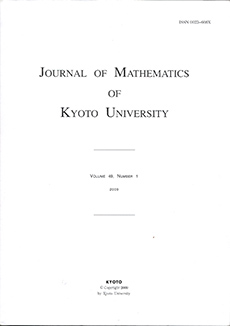Abstract
Let $R$ be a Noetherian local ring with the maximal ideal $\mathfrak{m}$. Assume that $R$ contains ideals $I$ and $J$ satisfying the conditions (1) $I\subseteq J$, (2) $I : \mathfrak{m}\nsubseteq J$, and (3) $J$ is $\mathfrak{m}$-full, that is $\mathfrak{m}J : x = J$ for some $x \in \mathfrak{m}$. Then the theorem says that $R$ is a regular local ring, if the projective dimension $\mathrm{pd}_{R}I$ of $I$ is finite. Let $\mathfrak{q} = (a_{1}, a_{2}, \ldots , a_{t})R$ be an ideal in a Noetherian local ring $R$ generated by a maximal $R$-regular sequence $a_{1}, a_{2}, \ldots , a_{t}$ and let $\bar{\mathfrak{q}}$ denote the integral closure of $\mathfrak{q}$. Then, thanks to the theorem applied to the ideals $I = \mathfrak{q} : \mathfrak{m}$ and $J = \mathfrak{\bar{q}}$, it follows that $I^{2} = \mathfrak{q}I$, unless $R$ is a regular local ring. Consequences are discussed.
Citation
Shiro Goto. Futoshi Hayasaka. "Finite homological dimension and primes associated to integrally closed ideals, II." J. Math. Kyoto Univ. 42 (4) 631 - 639, 2002. https://doi.org/10.1215/kjm/1250283831
Information





